The first thing you may notice about Joseph A. Favazza, Ph.D., the 11th president of Saint Anselm College, is his voice. Clear, welcoming, and with a subtle Southern accent, his words draw you in. They welcome you. They make you feel at home. This attribute couldn’t be more fitting, considering he has taken charge of an institution known for just that: hospitality.
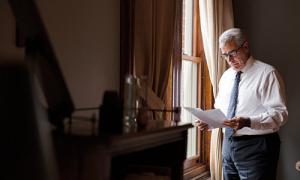
Photos by Leah LaRiccia
“Absolutely that’s a connection not lost on me,” says Dr. Favazza. “That element of welcoming is something I grew up with, and it very much resonates with me—the strong community, it is definitely a connection.”
Community, hospitality, and a sense of welcome are only a few of the many connections Dr. Favazza shares with the Saint Anselm community—making him the ideal person to lead the college as its 11th president.
The Making of a President
When Dr. Favazza speaks of the welcoming spirit he grew up with, he’s referring to the Southern hospitality he absorbed while growing up in Memphis, Tenn. Dr. Favazza’s parents were first-generation United States citizens, with both sets of grandparents emigrating from Sicily, Italy.
“My parents were children when their families first moved to Memphis,” he says. “My father was actually born in the North End of Boston, but my grandfather, who was a fisherman out of Gloucester, Massachusetts, was having a hard time finding work so the family moved to Memphis where they had friends and better connections for work.”
Neither of Dr. Favazza’s parents completed high school, but their youngest of four children would go on to receive his B.A. in history from St. Meinrad College in Indiana, an S.T.B./M.A. in theology, and a Ph.D. in religious studies from the Catholic University of Louvain Belgium, and a certificate from the Harvard University Institute for Executive Management.
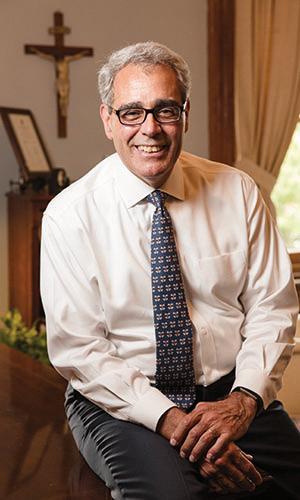
“My first year of university was actually at the University of Memphis, and then I decided I wanted to explore the priesthood, so I went to a seminary, which was run by Benedictines—and that was St. Meinrad,” he says.
Dr. Favazza was ordained a priest for the diocese of Memphis, and was a priest for 10 years. While he truly enjoyed the ministry, the parts he most enjoyed involved teaching. “I remember back in the seminary I had a priest who was teaching us how to give homilies,” says Dr. Favazza. “And I really thought I was doing a great job, but he said to me ‘you know, you’re teaching, not preaching.’” It was partly this “aha” moment that helped Dr. Favazza realize teaching needed to be part of his future.
Higher education was where he wanted to be, but it took time. He moved to Nashville in hopes of securing a position in higher education, but instead became director of planning and fund distribution for the United Way of Middle Tennessee. “That was such a fantastic experience which taught me a lot about community, public policy, and how decisions about resources were made,” he says.
It was around this time when Dr. Favazza and Paddy Cronin Favazza, Ed.D., were married. Having met their first year at the University of Memphis, Dr. Paddy Favazza had gone on to earn a Bachelor of Science in education and a Master of Education from the University of Memphis, as well as an Ed.D. from Vanderbilt University.
During the first years of their marriage, the couple adopted three siblings from Romania; Alina, Ana- Marlise, and Petr, and the family became complete with the birth of their fourth child, Isabella. The story of the adoption of the Favazzas’ three older children became the focus of a Hallmark Channel documentary, and the family was also a guest on the Oprah Winfrey Show. In the midst of their journey to create a family, the couple were named senior Fulbright scholars and taught for one semester at Babes-Bolyai University in Cluj-Napoca, Romania.
The family settled in Memphis when Dr. Favazza was appointed as assistant professor of religious studies at Rhodes College, and then later promoted to associate professor. He was then tapped to be the director of the Search for Values program for interdisciplinary humanities—a foundational program at Rhodes based on the Great Books program of the University of Chicago. For Dr. Favazza, this position was a first step into the role of higher education administration, and a step he found to be equal parts challenging and rewarding.
“I have to say I loved it, I loved engaging the faculty who were all from different backgrounds, and the conversations that ensued were sometimes difficult but also so fascinating,” he says. “But when it was time to make a decision, we made it.”
While Dr. Favazza remembers that first year as director being extremely challenging, he also found it to be a good reminder of what we ask of students. “It was really daunting that first year, and I’d ask myself ‘how can I do this?’” he says. “But this is what we ask of our students, to be lifelong learners—and it was modeling for our students that there’s wisdom in everything you engage in, and it’s important to continue to be curious.”
Bringing Out the Best in Everyone
Based on his experience at Rhodes, Dr. Favazza was becoming aware of a skillset he hadn’t fully appreciated in himself before: the ability to bring people together to achieve a common goal. It was this skill that would help lead him to become dean of general education for Stonehill College in Easton, Mass.
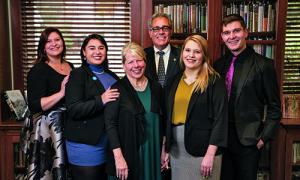
“Joe knows how to build strong campus partnerships. He did that when he came to the college first in his work with the faculty on revising our general education program,” says Stonehill President Rev. John Denning, C.S.C. “In 2017, when we decided to reorganize the college into two schools, his ability to engage faculty with respect, patience, and clarity played a key role.”
For Dr. Favazza, the move north to Massachusetts from Tennessee resulted in a huge growth for him professionally. “One of the biggest takeaways from my time at Stonehill was learning to work with a faculty that I didn’t grow up with,” he says. “At Rhodes, that’s where I cut my teeth as a faculty member, but then I had to take time to learn the faculty at Stonehill.”
While at Stonehill, Dr. Favazza strengthened his ability to bring people together to make important decisions. “The power you have as an administrator is to shape an agenda but once it’s out there, how it gets implemented, it can take some twists and turns—and that’s not a bad thing,” he says. “If you can shape an agenda, and then listen to the wisdom of others as we move it forward, that’s an important lesson.”
According to President Denning, Dr. Favazza’s ability to understand others and make the case for change was critical to the introduction of new and important majors. “Joe wasn’t just a senior college administrator, he was also a published scholar with deep expertise on topics such as forgiveness and reconciliation, academic leadership, and pedagogy,” says President Denning. “That range of scholarship gave him great credibility throughout campus.”
Dr. Favazza grew from his position as dean of general education into the role of associate vice president for academic affairs and dean of the faculty, before ultimately becoming provost and vice president for academic affairs—a role he was content to be in, with no plans of change. That is, until the Hilltop came calling.
Coming Home to the Hilltop
In February of 2019, Dr. Favazza received a phone call from the search committee tasked with finding the next president of Saint Anselm College, telling him he had been nominated to throw his hat in the ring. Flattered, his first reaction was “not now.” Both Drs. Favazza were more than happy at Stonehill. Dr. Paddy Favazza had been on faculty at Stonehill for two years as professor of special education, and Dr. Favazza had found a happy, comfortable stride serving as provost.
But another call from the search committee made him think again. He debated whether or not to consider the opportunity, but ultimately he remembered the first time he learned of Saint Anselm. “When my oldest daughter Alina was looking at colleges in the fall of 2009, we visited Saint Anselm and I remember it distinctly, because both my wife and I were just totally blow away,” he says. “For me, having gone to a Benedictine college, it was like coming home.”
By mid-March 2019, he felt this was something he needed to pursue. “I understand the vow of stability having gone to a Benedictine college, I understand the competitiveness of the New England higher education environment, I understand Catholic higher education, I was familiar with Saint Anselm from a distance because of my experience visiting campus with my daughter, and as a competitor while at Stonehill, and I felt I could really make a difference here,” he says. “I remember talking with Paddy about how I wouldn’t consider anything unless I felt I could make a difference.”
In his short time on campus, it is clear Dr. Favazza is doing just that. “My positive first impression has only grown as I continue to witness and hear of the strengths and talents Dr. Favazza brings to the office of president,” says Abbot Mark Cooper, O.S.B. ’71, chancellor of the college, who also served on the presidential search committee. “I believe him to be a man of great integrity, and see in him the collaborative leader who can build upon the considerable strengths of Saint Anselm, and who is capable of leading this excellent college to even greater prominence.”
Benjamin Horton, Ph.D. ’12, assistant director of the academic resource center and chair of Saint Anselm College Staff Council, agrees. “Having gotten to know Dr. Favazza over the past few months, I believe he truly has embraced the Anselmian spirit and understands our college’s commitment to going the extra mile,” he says. According to Horton, Dr. Favazza always provides a listening ear, an open heart, and a true commitment to students. “Our community is so blessed to have a leader who understands the importance of community, of faith, of family, of vision, of humble servant leadership, and of integrity.”
This sentiment also is shared by the faculty of Saint Anselm College. “Dr. Favazza has been proactive in soliciting faculty input and has begun establishing a collegewide environment of transparency in decision-making and policy,” says Tauna S. Sisco, Ph.D., associate professor and chair of the department of sociology and social work and Faculty Senate president. “This transparency builds trust and collaboration, both of which are essential for our academic community and future at Saint Anselm College.”
Dr. Favazza has quickly immersed himself into life on campus, taking time to welcome new students on Move-in Day, and greet returning students, while also getting to know the entire Saint Anselm community. “Hands down, I have fun every day when I come to work,” he says. “I love being out meeting students, I’ve enjoyed meeting the staff, and the faculty, and going out meeting some of our key benefactors, alumni and friends—I’ve been so awed by the level of commitment from everyone, how everyone is invested in the success of the school.”
Rising to the Challenge
While Dr. Favazza has enjoyed getting to know the community, he is well aware of the challenges facing Saint Anselm College, and small liberal arts colleges throughout New England.
“The big challenge is enrollment,” he says. “It’s a very competitive landscape right now, and we have to make sure we are laser-focused on telling our story, and that we are being as innovative as possible in regards to how we leverage financial aid with our students.”
Dr. Favazza also sees the importance behind exploring new markets and modalities for delivering higher education. “That doesn’t mean we’re going to start a massive online program, but we may have some opportunity we haven’t explored yet for summer or winter online programs.”
With every challenge, however, comes opportunity, and Dr. Favazza sees many ahead for Saint Anselm. “There’s an opportunity for some very targeted graduate programs,” he says.
According to Dr. Favazza, the college is beginning to work on 4-plus-1 programs, but he also sees an opportunity for interdisciplinary master’s programs that would combine the strengths of different departments such as healthcare administration with business and science, or a political communications master’s based on the strengths of faculty in politics and communication. “For me, these are part of the vision, but also part of strengthening Saint Anselm,” he says.
These ideas, and the manner in which they are presented, help distinguish Dr. Favazza as a leader, and a person. “During the interview process, it was readily apparent Dr. Favazza clearly understood the challenges that small liberal arts colleges in the Northeast are facing,” says Ann M. Catino, Esq. ’82, chair of the board of trustees for Saint Anselm College. “But his style, demeanor, and overall approach to those challenges was particularly impactful—Dr. Favazza is a listener, which certainly embraces our Benedictine identity very well.”
When it comes to strengthening the college, perhaps most important for Dr. Favazza is making sure the community understands who he is, what his intentions are, and how deep his commitment is to Saint Anselm College.
“I am committed to collaboration and communication—I want to build trust with all campus constituencies, particularly faculty, staff, and the monastery,” he says. “I want people to know that I am approaching everything with honesty, integrity, and as much transparency as possible.”
Southern Flare
It may come as no surprise that while Dr. Joseph A. Favazza and Dr. Paddy Cronin Favazza now consider themselves New Englanders (Granite Staters to be exact), there are a few things they miss about Memphis. Namely, barbecue. “There’s a restaurant called Corky’s Ribs & BBQ, started by a guy after he won an international barbecue competition, and there’s a dry-rub seasoning you can only find at a restaurant called Charlie Vergos Rendezvous,” says Dr. Favazza.
And in Dr. Favazza’s opinion, starting the day with a cup of chicory coffee can’t be beat, but also can’t easily be found up north.
Finally, from Dr. Paddy Favazza’s home state of of Louisiana, besides all of the delicious Cajun foods and seafood dishes, there’s a slightly different delicacy that they bring back home after every trip back to Louisiana: alligator sausage. “You use alligator meat to make a sausage, and you put it on the grill, and it, well, tastes like chicken,” he says.
A Master of Inclusion
Paddy Cronin Favazza, Ed.D., brings with her to the Hilltop a passion for making sure every child has a place in the classroom.
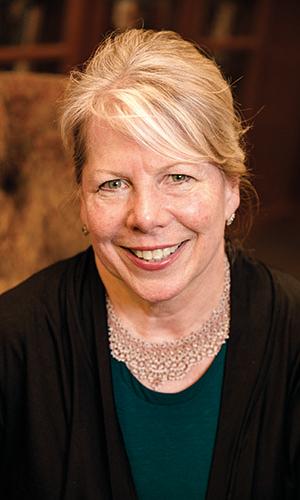
When I first met Paddy Cronin Favazza, Ed.D., she was getting ready to fly out to Kars, Turkey, to attend an international early childhood conference as a keynote speaker. The prospect of her upcoming travels didn’t phase her in the least—she’s spent her adult life learning, teaching, writing, and traveling to spread the word on the importance of inclusion of young children with disabilities.
“Our research team spent years developing curriculum on this subject, and we’ve been working with a team from Trakya University in Edirne, Turkey, to undertake translation and research on our book The Making Friends Program: Supporting Acceptance in Your K-12 Classroom (Paul H. Brookes Publishing Co., Inc., 2016),” says Dr. Favazza. “And, we’ve been working with them for three years on this new project, CHAMPPS (CHildren in Action: Motor Program for PreschoolerS), and now we finally get to meet face-to-face.”
Earning a Bachelor of Science in education and a Master of Education from the University of Memphis, and a Doctor of Education from Vanderbilt University, Dr. Favazza knew from a young age education was where she wanted to be. “My mom was a teacher and I was inclined in that direction early on,” she says.
As for finding her concentration in special education and inclusion, she credits where, when, and how she grew up. “The context in which I grew up really played a role in the path I chose,” she says. “I grew up in the Deep South during the civil rights movement and that was a daily conversation for my family, seeing people marginalized based on color, gender, and disability.”
The third of five children, Dr. Favazza also points to her father for helping her find her passion to fight for the rights of others. “Our parents, especially our father, always told us ‘use our voice and the opportunities you have been given for others,’” she says. “I teach from that perspective: for equity and equality.”
With a long list of accomplishments to her name, including published works and teaching positions (most recently as professor of special education at Stonehill College), Dr. Favazza has been appointed Senior Research Fellow at Saint Anselm, but she also is looking forward to what else the future may hold. “I really want this to be a year of exploration,” she says, including learning about the work with immigrants and refugees in New Hampshire, early childhood special education in New Hampshire, and access to higher education for persons of color. She also is excited to explore campus opportunities, including the Meelia Center for Community Engagement and the Father Jonathan, O.S.B., Center for Intercultural Learning and Inclusion at Saint Anselm.
Regardless of what Dr. Favazza’s next steps may be, she is confident she and her husband have settled in the right place. “We have been deeply touched and overwhelmed by the warm embrace of this community,” she says. “It’s a very special place—you see it, you feel it, you know it.”—K.G.D.
The Inauguration of President Favazza
Saint Anselm College officially installed Dr. Joseph A. Favazza as its 11th president on October 17, marking the beginning of a new moment in the college’s history. In a ceremony in the Thomas F. Sullivan Arena, Dr. Favazza shared with the crowd of faculty, staff, students, alumni, friends, trustees, and delegates from colleges and universities all over the country, his vision for the future of the hilltop institution.
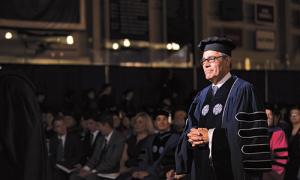
“At Saint Anselm, learning is not a spectator sport. It happens when we study‘the great thing,’ through engagement with communities, and by serious introspection and contemplation,” he said. “We are committed to an education that is simply transformative.”
The office of the president was conferred by Abbot Mark Cooper, O.S.B. ’71, chancellor of the college, and Ann M. Catino ’82, chair of the board of trustees.
The ceremony also featured remarks by Alumni Association President Katie Leidemer Mahan ’02, Student Government Association President Joshua Hughes ’20, Staff Council Chair Benjamin Horton, Ph.D. ’12, Faculty Senate President Professor Tauna Sisco, and Reverend John F. Denning, C.S.C, president of Stonehill College.
The installation concluded with Soar, music composed for the event by Director of the Dana Center for the Humanities Joseph Deleault with lyrics by Deleault’s partner Academy Award Winner Ernest Thompson. Featuring a 60-person choir, brass and percussion sections, saxophone, piano, and fiddle, the piece celebrated Dr. Favazza’s arrival to the college and installation as president.
The inauguration ended with a Benediction from The Very Reverend Jonathan P. DeFelice, O.S.B., president emeritus and judicial vicar for the Archdiocese of Boston.
The installation ceremony followed a Mass of the Holy Spirit on October 16 celebrated by Abbot Mark, with concelebrants The Very Reverend Jonathan P. DeFelice, O.S.B., The Reverend John F. Denning, C.S.C., and The Reverend Francis Daly.
—Laura (Rossi) Lemire ’06
